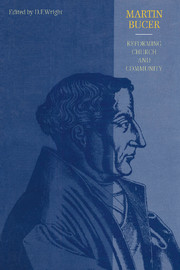Book contents
- Frontmatter
- Contents
- Notes on contributors
- List of abbreviations
- Introduction
- 1 Martin Bucer and the Old Church
- 2 The relation between church and civil community in Bucer's reforming work
- 3 Bucer's influence on Calvin: church and community
- 4 The church in Bucer's commentaries on the Epistle to the Ephesians
- 5 Church, communion and community in Bucer's commentary on the Gospel of John
- 6 Eucharistic communion: impulses and directions in Martin Bucer's thought
- 7 Martin Bucer and the ministry of the church
- 8 Infant baptism and the Christian community in Bucer
- 9 Bucer's ecclesiology in the colloquies with the Catholics, 1540–41
- 10 The Strasbourg Kirchenpfleger and parish discipline: theory and practice
- 11 Ecclesiological motifs behind the creation of the ‘Christlichen Gemeinschaften’
- 12 Martin Bucer in England
- 13 Martin Bucer and the Englishing of the Psalms: pseudonymity in the service of early English Protestant piety
- Bibliography
- Biblical index
- Index of Bucer's works
- Index of modern authors
- General index
7 - Martin Bucer and the ministry of the church
Published online by Cambridge University Press: 22 September 2009
- Frontmatter
- Contents
- Notes on contributors
- List of abbreviations
- Introduction
- 1 Martin Bucer and the Old Church
- 2 The relation between church and civil community in Bucer's reforming work
- 3 Bucer's influence on Calvin: church and community
- 4 The church in Bucer's commentaries on the Epistle to the Ephesians
- 5 Church, communion and community in Bucer's commentary on the Gospel of John
- 6 Eucharistic communion: impulses and directions in Martin Bucer's thought
- 7 Martin Bucer and the ministry of the church
- 8 Infant baptism and the Christian community in Bucer
- 9 Bucer's ecclesiology in the colloquies with the Catholics, 1540–41
- 10 The Strasbourg Kirchenpfleger and parish discipline: theory and practice
- 11 Ecclesiological motifs behind the creation of the ‘Christlichen Gemeinschaften’
- 12 Martin Bucer in England
- 13 Martin Bucer and the Englishing of the Psalms: pseudonymity in the service of early English Protestant piety
- Bibliography
- Biblical index
- Index of Bucer's works
- Index of modern authors
- General index
Summary
On 14 October 1549 Martin Bucer wrote to a certain Johannes Marbach one of his anxious, agonized letters from England. Bucer wrote with real urgency, almost as if he sensed that Marbach might acquire greater responsibilities in the future, as he did. Fittingly enough, he left his most important message for the end of the letter. There he admonished Marbach always to remember that ‘Nothing in this life is more sacred or greater … than those things that pertain to the sacrosanct evangelical ministry, the ministry of the eternal salvation of humanity itself’.
Near the end of his life and now an émigré, Bucer meant what he wrote. Yet, and in spite of his clear statement, only three scholars – Jacques Courvoisier in 1933, Werner Bellardi in 1934, and Gottfried Hammann in 1984 – have devoted entire volumes to this aspect of Bucer's career. However, even these scholars subordinated Bucer's clear emphasis upon ministry as such to different, perhaps wider, interests. For Courvoisier, the issue was the origins of Calvin's concept of ministry; for Bellardi it was the beginnings of Pietism; for Hammann it is current discussions of the relationship between people's churches (Volkskirchen) and confessional churches (Bekenntniskirchen). Although in dissimilar ways, each of these works finally focuses on Bucer's ecclesiology rather than on ministry as such.
- Type
- Chapter
- Information
- Martin BucerReforming Church and Community, pp. 83 - 94Publisher: Cambridge University PressPrint publication year: 1994
- 1
- Cited by



